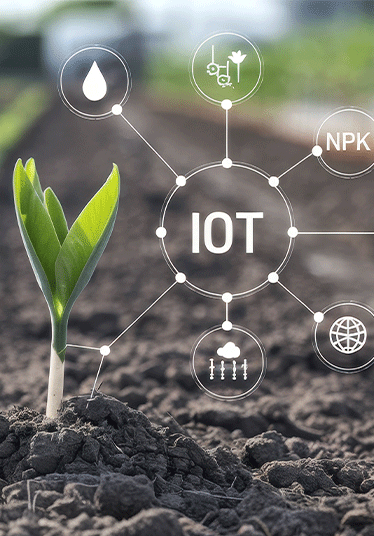
IoT and cloud platforms in AgriFood Production
Overview
| Module Title | IoT and cloud platforms in AgriFood Production |
| Subject Area | Biosystems Engineering |
| Credits | 5 |
| NFQ | 9 |
| EFQ | 7 |
| Start Date | 20th January 2026 |
| Time | Monday 13:00-15:00 and Voluntary Feedback/tutorial session Thursday 13:00 (subject to change) |
| Duration | 12 weeks |
| Mode of Delivery | Online |
| Lead Academic | Dr. Joseph Sweeney |
| Fee | €895 standard module fee plus a €50 additional charge for purchase and shipping of Arduino parts that will be used in the module. |
| Application Deadline | 5th January 2026 |
This module examines the principles and theories that underpin the concept of Internet of Things (IoT) enabled Agri-Food Production.
The module will focus on:
(i) IoT Cloud Platforms, sensors and their applications to agriculture
(ii) Proximal Sensing
(iii) IoT decision support
(iv) Power Management
One or more IoT case studies will be provided to students to increase their understanding of what is required for successful smart Applications in real world agricultural systems. Students will also learn the basics of programming and communication with an IoT cloud platform using Arduino based IoT kits, where they will implement their own virtual IoT Sensor agricultural smart application.
Sustainable Energy and Environmental Impact
This micro-credential is designed for professionals, researchers, and students interested in the application of IoT technologies and Cloud platforms in agriculture, green tech and food production. It is particularly relevant for:
- Agri-Tech and Agri-Food Professionals looking to integrate smart technologies into farming and food production systems.
- Engineers and Technologists working in IoT, automation, or precision agriculture.
- Sustainability and Environmental Professionals seeking data-driven solutions for resource-efficient food production systems.
- Farmers and Agri-Business Managers interested in leveraging IoT and cloud platforms for improved decision-making and operational efficiency.
- Students and Researchers in agriculture, engineering, and data science aiming to develop expertise in IoT applications for smart farming.
No prior experience in IoT is required, making this module suitable for those looking to develop foundational knowledge and practical skills in IoT-enabled agri-food systems.
On completion of this module students should be able to:
- Demonstrate an understanding of the principles of IoT enabled Agri-Food Production
- Understand the principles of how multisource data is acquired, interpreted, processed and integrated in IoT Systems
- Propose and develop a cloud based IoT sensor that integrates multisource data to create a virtual Agricultural IoT system
By completing this micro-credential, you will:
- Gain In-Demand Skills – Develop expertise in IoT technologies, cloud platforms, and sensor applications for smart agriculture.
- Enhance Decision-Making – Learn how to collect, analyse, and use real-time data to optimize agricultural production.
- Hands-On Experience – Work with an Arudino based IoT practical kit to build and implement a virtual IoT sensor application, gaining practical knowledge in programming and cloud communication.
- Stay Ahead in Agri-Tech – Understand the latest innovations in IoT-enabled farming and how they drive sustainability and efficiency.
- Boost Career Prospects – Strengthen your professional profile in agriculture, engineering, and sustainability with IoT expertise.
This course equips you with the technical and analytical skills needed to leverage IoT and cloud platforms for smarter, more efficient, and sustainable agri-food production systems.
Graduates, jobseekers or individuals who are in full time employment, with a Level 8 Honours degree with minimum 2:1 award (NFQ level 8) or international equivalence in disciplines which have mathematical, technological and/or analytical skills. Examples of acceptable disciplines are engineering, physical science, chemistry, architecture, digital agriculture, computer science and environmental related degrees. Those without a Level 8 honours degree in a relevant subject but with >5 years relevant professional experience in a relevant field will be considered. Minimum English language requirements will apply. The UCD College of Engineering & Architecture team will assess applications.
This is a standalone module. No Requirements, Exclusions or Recommendations for this module. No Module Requisites or Incompatibles.
Assessment will be based on four assignments (Including Essays and presentation), to be delivered in weeks 6, 8, 10 and 12 of the module.
Students over multiple practical sessions will program, calibrate and deploy IoT sensors in the field where they will communicate, capture and process data transmitted to and from an IoT cloud platform. They will be tasked with developing and trialling their own IoT sensor system at their own premises and will present the results that they obtain as their final assignment.
Feedback individually to students, post-assessment. Pre-and post feedback on assignments and presentations will be provided throughout the semester.
An online tutorial feedback session is offered every Thursday during lunch, where students can engage to address technical questions they may have in relation to the IoT practicals they are conducting online.
This module is part of several stackable learning paths, including MSc in Digital Technology for Sustainable Agriculture and HDip in Spectroscopic Technologies & Data Analysis for Advanced Manufacturing.
It is also included in two Springboard+ application 2025 potential programmes:
Grad Cert Applied Spectral Imaging with Data Analytics ; and Grad Cert Circular Bio-Economy Implementation.
On successful completion of this micro-credential, you will receive credits as per the European Credit and Transfer System. These credits are recognised by the awarding institution as credits aligned to learning completed at postgraduate level.
If you have any questions about this micro-credential, or would like to speak to a UCD staff member, please contact (opens in a new window)microcredentials@ucd.ie.
